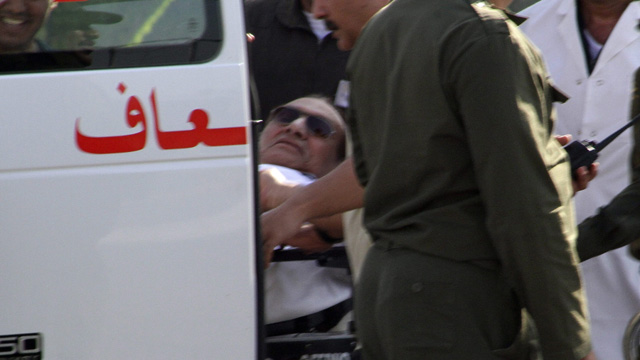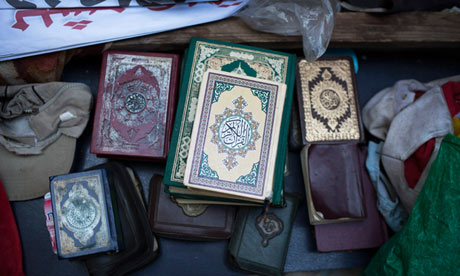Egypt mosque besieged as Islamists prepare fresh demos
 Supporters of Egypt's ousted President Mohammed Morsi on Friday march
towards Old Cairo as they carry the coffin, covered with a national
flag, of their colleague who was killed during Wednesday's clashes in
Cairo, Egypt. (AP Photo/Amr Nabil)
Supporters of Egypt's ousted President Mohammed Morsi on Friday march
towards Old Cairo as they carry the coffin, covered with a national
flag, of their colleague who was killed during Wednesday's clashes in
Cairo, Egypt. (AP Photo/Amr Nabil)
CAIRO - Egyptian
security forces surrounded a Cairo mosque full of supporters of ousted
president Mohamed Morsi on Saturday as protesters planned fresh marches
after street battles that left more than 80 dead.
The tense
standoff at the Al-Fath mosque came after bloody clashes that killed 83
people across the country and resulted in the arrest of more than 1,000
alleged supporters of Morsi's Muslim Brotherhood.
The crackdown
has divided Egyptians as never before in recent history, splintering the
army-installed government and inviting international censure.
One
protester said nearly 1,000 people were trapped in the mosque, which
had earlier held the bodies of more than 20 people killed in Friday's
clashes.
Soldiers had offered to evacuate the women but insisted
on questioning the men, which the protesters refused, a demonstrator on
the scene said.
Both sides accused the other of opening fire but the gunfire then ended, one person inside the mosque told AFP.
"Thugs tried to storm the mosque but the men barricaded the doors," she said.
Security
officials quoted by the official MENA news agency said that "armed
elements" had been shooting at security forces and police from inside
the mosque.
Morsi's Freedom and Justice Party (FJP) pleaded for
another "massacre" to be avoided after at least 578 people were killed
across the country Wednesday when police cleared protest camps set up by
loyalists of the former president deposed by the military on July 3.
It was not possible to verify the numbers in the mosque independently.
The
latest unrest started as Morsi supporters emerged from mosques in the
capital to protest in what they billed as a "Friday of anger" following
Wednesday's bloodbath.
Violence erupted almost immediately, with gunshots ringing out in Cairo and security forces firing tear gas.
In
the capital, a man leapt off a bridge near a police station to escape
shooting as police armoured vehicles advanced on protesters, witnesses
said.
An AFP correspondent counted at least 19 bodies in one Cairo
mosque, while witnesses said more than 20 corpses had been laid out in a
second mosque.
Elsewhere in Egypt, 10 people were killed by
security forces and dozens injured in the canal city of Suez when they
gathered to protest in defiance of the curfew.
Their deaths brought to 83 the number killed in nationwide violence although the FJP spoke of 130 dead in Cairo alone.
Read More Here



















































